Doing our part
Thursday, December 30, 2004On BahrainiBlogs, I have posted a list of the groups in Bahrain who are collecting donations for the victims of the Indian Ocean tsunamis. Please view the list and consider giving.
On BahrainiBlogs, I have posted a list of the groups in Bahrain who are collecting donations for the victims of the Indian Ocean tsunamis. Please view the list and consider giving.
We all have our complaints against the Bahraini government and the parliament for sometimes restricting free speech and especially free press through the Press Law, the Societies Law, the proposed law on gatherings (1, 2), and blocking some websites. Despite all of the problems though I think it is safe to say that Bahraini bloggers have, as of yet, not had any problems in speaking our minds about politics, human rights, the royal family, or anything. (If any Bahraini bloggers have encountered problems then please tell).
Unfortunately not all of our blogger comrades in the region enjoy this freedom. (Via Winds of Change) In a recent blog entry, Mohammad Ali Abtahi, an Iranian politician and former VP of Parliamentary Affairs, has published some details of interrogation and torture faced by the Iranian bloggers who were imprisoned earlier. This blog entry (written in Persian) has been translated into English by UK-based Iranian blogger Parthisan. Here is the start of the translation:
Following a call from the President, the constitutional supervision committee -- of which I'm a member -- invited a number of imprisoned bloggers for a meeting to investigate about the way they were treated in prison. Mr Hanif Mazruee, Ghoreishi, Ms Fereshte Ghaazi, Naderpoor and Ms Mahboobeh Mollagholi attended the meeting. They told very important points about the unjustifiable treatment they had received, including:
1- Physical torture, punches and kicks: "he banged my head to the bench that made my recently-operated nose bleed, and later I found out that they broke my nose"; "they punched us"; "we were alone in single cells for months"; and things of this kind... (Continue)
Read the rest here.

So Bahrain's "National Day" was celebrated here just over a week ago. Along with all of the nice lights on the buildings, our streets have also been lined with billboards displaying the mugs of the ruling family. They all look something like the one shown in the photo above.
This year however I came across one billboard which was unlike any of its kind I've seen in all my years living here. See how long it takes you to spot the crucial difference:

Indeed, the Prime Minister (the King's uncle) has displaced the King from the all-important central position on the billboard. For those who aren't from Bahrain, normally we would see the King's mug occupying the centre, flanked by the faces of the Crown Prince and the Prime Minister, as seen in the photo at the top of this post. Many government and private institutions hang the rulers' portraits in their buildings, and there also the order is always the same (the King being in the middle). A few times I have even heard that it is a punishable offence to hang the portraits in a different order... that might just be a rumour, but it shows how the issue is viewed here.
So I was obviously surprised to see this order shuffled around. But I suspect there was a reason behind it; it's possibly a piece of brown-nosing left over from the wave of ass-kissing that was initially sparked by the Al-Khawaja affair. Maybe I'm reading far too much into this one billboard, but I think it's significant that it is located in the same area where one of the (attempted, but failed) "loyalty to the PM" demonstrations took place.
That some individuals are willing to replace the King with the PM (on a mere billboard albeit) gives some credence to the "Old Guard vs Reformist" theory of modelling Bahraini regime politics. I certainly feel that the internal rift has deepened in recent years and months, and it seems set to continue in the future. Let's see what happens.
Oh and if you're interested in this type of "regime art", then maybe read this post about another political billboard that I wrote a long time back .
A reminder from Mother Earth that our stay in Her dominion is subject to Her mercy and grace. Let us pray that She restores her grace on those affected by this catastrophe.
From the BBC:
More than 7,000 people have been killed across southern Asia in massive sea surges triggered by the strongest earthquake in the world for 40 years.
The 8.9 magnitude quake struck under the sea near Aceh in north Indonesia, generating a wall of water that sped across thousands of kilometres of sea.
More than 3,200 died in Sri Lanka, 2,200 in Indonesia and 2,000 in India.
Casualty figures are rising over a wide area, including tourist resorts on Thailand packed with holidaymakers. (Continued)
Eerily, this quake has taken place exactly one year (to the day) after the 6.6 magnitude earthquake in Bam (Iran) that killed some 30,000 people and flattened the city.
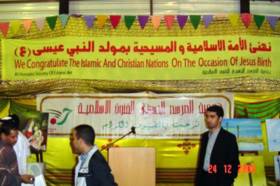
It's the festive season, so here's something to give you the warm fuzzies and make us all want to love one another. The Al Hussaini Society for Islamic Arts organized an amateur art competition under the theme "Jesus Christ The Saviour of Mankind" from Dec 21 - 24, to commemorate his birth. For the closing ceremony a few lectures were given about the significance of Jesus Christ for both Muslims and Christians. Have a look at some of the works from the event at Montadayat.org.
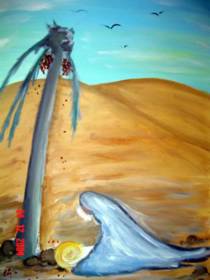
Yes, in today's political environment it's crucially important to remind ourselves that there we have more things in common with each other than we have differences. And who better to remind us of this than Jesus of Nazareth. Even though we might argue about whether he was a god, a prophet, a regular human being, or just a myth, there is something we can learn from him. It's not important whether we believe in his existence or not, because the wisdom lies in the ideals of Humanity that he left behind (or that has been created about him, if you view it that way).
Maybe his most well-known saying is that of "turning the other cheek" (Matthew 5:38-44 King James Version):
Ye have heard that it hath been said, An eye for an eye, and a tooth for a tooth:
But I say unto you, That ye resist not evil: but whosoever shall smite thee on thy right cheek, turn to him the other also.
And if any man will sue thee at the law, and take away thy coat, let him have thy cloak also.
And whosoever shall compel thee to go a mile, go with him twain.
Give to him that asketh thee, and from him that would borrow of thee turn not thou away.Ye have heard that it hath been said, Thou shalt love thy neighbour, and hate thine enemy.
But I say unto you, Love your enemies, bless them that curse you, do good to them that hate you, and pray for them which despitefully use you, and persecute you;
In these few lines is laid out the most powerful political tool available to us. How different this world would be if we had the moral strength to adopt these wise words. Take note that it doesn't only say "do good to your enemies"; it says "love your enemies". It isn't about outwardly behaving in a certain way, but rather about taking control of your Self; a spiritual struggle.
I'm sure most of you know much more than me about Jesus and his message, but I thought I'd remind myself of this his beautiful advice as I begin to come up with some New Year's resolutions. Anyhows, a Merry Christmas to everyone!

You might remember a while ago I wrote about the historic 'Ain Umm as Sujoor freshwater spring and the need to protect it. You might even recall when I wrote about the need to protect the greenbelt of palms that runs across the northern coast of the island. Well its obvious that the government doesn't read (or agree with) my blog. According to Sayed Alawi Sharaf, a member of the Northern Municipal Council, plans are being made for a highway to be built right on top of the ancient well and cutting through the greenbelt.
The GDN reported yesterday:
Families will protest tomorrow against plans for a highway they say would scythe through the villages of Diraz and Barbar.
They are ready to stand in front of the bulldozers to protect their homes, says local councillor Sayed Alawi Sharaf.
The residents want plans for the road to the new Northern Town to go back to the drawing board.
They have submitted a petition to the Northern Municipal Council, rejecting any road that would cut through the villages. (Continued)
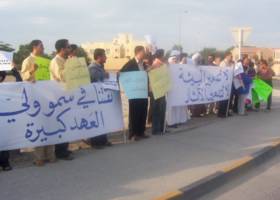
So I went to the protest today to see what exactly the fuss is all about. They were handing out plans of the proposed road, which you can see below (click image to enlarge, jpg 746KB):

The original map is in black and white, but I added colour to make things easier to see. Um as Sujoor is circled in blue, there is an intermediate school shown in green, and the proposed new highway is marked in red. You can see that the planned highway will be right next to the school which is another serious problem. Asides from this the people were obviously concerned about having a highway going right through their villages, creating pollution, noise and generally upsetting the tranquility of the residential area. It was claimed that about 70 homes will have to be demolished in the process, for which the owners will only be compensated with 70% of the value in cash. A proposed alternative to cash compensation is the promise of a home in the new Northern City (for which the highway is being planned)... however no one is really pleased by this idea because construction on the Northern City has not even started, so currently its just a piece of the sea. And all those who own land on the route of the proposed highway are currentlynot being issued construction permissions to build homes from the ministry.
Apparently, there is an alternative route for the highway, but that has been shelved since it passes by land and homes owned by some rich and influential folks... typical. But more than the highway itself, I'm really uncomfortable with the proposed Northern City, and why we have to keep on reclaiming land on the northern shore. There's lots of empty land down south that can be developed, but we keep building new cities in the sea. I guess in the end it comes to back to those rich and influential folks who make sure none of their interests are affected.
Anyways, it was good to see people expressing their views freely at the protest. And I also bumped into an old friend who made an appearance in disguise:

And as usual, let me leave you with some photos of a few aspiring activists:
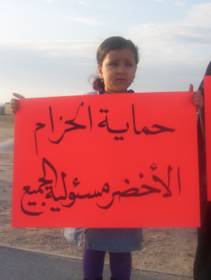

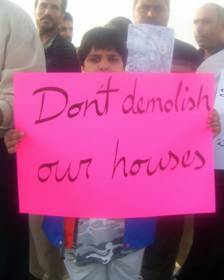
The following article was printed in the GDN on 22-Dec-04:
Highway protest
By MOHAMMED AL A'ALI
FAMILIES will protest tomorrow against plans for a highway they say would scythe through the villages of Diraz and Barbar.
They are ready to stand in front of the bulldozers to protect their homes, says local councillor Sayed Alawi Sharaf.
The residents want plans for the road to the new Northern Town to go back to the drawing board.
They have submitted a petition to the Northern Municipal Council, rejecting any road that would cut through the villages.
The petition has been submitted through their councillor Sayed Alawi Sharaf, who has called for the demonstration.
Earlier this year, council chairman Sayed Majeed Al Sayed dismissed claims that a road would cut through both villages.
He said it was one of the proposed new roads, but no decision had yet been reached.
Mr Al Sayed said then that the council would refuse it right away, without the residents even asking.
Mr Sharaf, who is the council's services and public utilities committee chairman, told the GDN yesterday that the demonstration was a clear warning to the government if it tried to go ahead with the plans.
"Residents will stand in front of bulldozers, if that means a halt to the construction of the new road," he said.
"I have seen the plans and the road will cut through houses and gardens and will divide the villages into halves."
Mr Sharaf urged residents to gather at Saar Roundabout, off Budaiya Highway at 3.30pm tomorrow.
"Every resident should be present there, because without your presence, these plans may go ahead," he said.
Mr Sharaf said residents would find it hard to find alternatives if their homes were demolished to make way for the road.
"Most have just built new houses after taking bank loans and tearing down their houses means paying money to the bank for a house which does not exist," he said.
"Even if the government compensates them, they will not include interest, which means thousands of dinars will still be paid by the owners."
The new BD1 billion town in the Abu Sobh Coastline area, will provide homes for 50,000 Bahraini families.
The 1,500 hectare town will include 30,000 homes for more than 150,000 people.
-----
Update (26-Dec-04): The GDN reported yesterday:
A planned highway leading to the new BD1 billion Northern Town does not cut through Ain Um Al Sajour, an historical site listed in the archaeological sites owned and protected by the Archaeology Directorate said Information Ministry Under-Secretary Mahmood Al Mahmood. He said the ministry has not been informed of any project that may disturb the site.
Well that's good to hear. The question then is why would Northern Municipality councillor Sayed Alawi Sharaf claim that the road is being planned to go over Um as Sujoor? And where did he get the map (shown above) from?

Last Thursday (Dec 16), Bahrain officially celebrated its "National Day". On Friday (Dec 17) Bahrain officially celebrated Accession Day, however in many quarters the day was unofficially marked as Martyr's Day (3eed al-shuhuda) and spent in mourning or remembrance. Bahrania posted about this last week, but I thought I'd comment on it also because it is an important issue that gets no coverage in the press.
During the preceding week a program of events was lined up, including visits to the graves and families of the martyrs, and finally culminating in a protest march that passed by the Prime Minister's office in downtown Manama on Friday 17th. I wasn't able to attend myself, but you can view photos of the march at Montadayat.org.

Photo source: Montadayat.org
As Bahrania mentioned, 3eed al-shuhuda is a day to remember all those who were killed and tortured at the hands of Bahrain's "security" forces and the CID for demanding political change (read Bahrania's post for details). When Shaikh Hamad took over from his father in 1999 he promised an end to all such actions by abrogating the State Security Law, emptying the jailcells of all political prisoners, allowing political exiles to return and ending the travel ban on dissidents. I do commend the King for taking these brave steps at a time when he could have just maintained the status quo (and I imagine there were significant internal forces pressuring him to keep it). However, this is the very minimum we should expect and demand of our leaders, and there is much more left to be done.
It's all well (very well) that there is no more torture going on here, but in order for the people to truly trust that the ruling regime will never engage in such activities again, it needs to publicly admit its former mistakes. We need a clear statement from the top saying "Yes, we erred in the past. We weren't thinking straight, and we apologize to the nation for the harm caused. We have changed our ways and such action will never be tolerated in the future".

Photo source: Montadayat.org
...back to reality. Unfortunately I don't see the ruling regime coming out with that statement anytime in the near future. The problem is that the many of the Old Guard that oversaw the torture and killings are stilling sitting in influential positions. For the Reformists in regime to come clean to the nation, they would have to acknowledge the fingers being pointed at the Old Guard. As I've mentioned several times before (1, 2), in our part of the world "saving face" is very important, so I'm sure the King faces alot of pressure to not bring some of his family members, and their associates, into disrepute. And that is obviously what compelled him to issue the infamous Royal Decree 56, ensuring that the torturers will never be tried.
That does not mean however that we should not continue demanding truth and reconciliation. Maybe not tomorrow, but sooner or later the regime will need the trust of the people.
If you haven't checked it out already, please visit the Free Ahmed Blog. Ahmed was arrested in May of this year on drug related charges. It has been seven months since his arrest, but he still has not faced a trial or been released on bail. On the 12th of December, Ahmed and 63 other prisoners in similar situations commenced a hunger strike demanding either an immediate trial for their cases, or that they be released on bail until then. (To read news reports, click here).
In the new democratic era of Bahrain, the judiciary is the institution that is most in need of an overhaul. No one has any faith in our judges, if one is luck enough to get a trial that is. Like the 64 prisoners on hunger strike, there are also hundreds of other maids and expat labourers who have been abused, but get no justice because it takes so long to get a trial that no one bothers (read this). Ask Mahmood, and he will tell you about how it is a waste of time going to the courts for a fair verdict about a business related conflict, so instead most people will take a loss and settle out of court.
I'm not sure exactly what we should be doing to fix the problem, but it's important that we continue discussing the issue. Hopefully this will pave the way towards formulating a plan to bring about change.
Another horrific story about abused maids in Bahrain. When will it end?
From the GDN:
[+/-] show/hide full news article
Agent is held for beating up maid
By TARIQ KHONJI
MANAMA: A Sri Lankan manpower agent is in police custody after a runaway maid accused him of severely beating her.
The man is said to have a history of beating and raping maids he brings into the country.
Migrant Workers' Group member Marietta Dias said that the man was arrested on Wednesday after the maid, also a Sri Lankan, ran away from her Bahraini employer because he had threatened to send her back to the manpower agency.
The woman, who arrived in Bahrain on December 10, claims that she was unable to do her employer's work because she was still injured from the beating she received at the agent's hands.
Ms Dias said that the woman's lips were swollen and that she claims to have been punched and kicked in the face repeatedly.
The woman found her way to the group and was taken to the police where she filed a formal complaint.
The group tracked down another of the agency's former maids, also Sri Lankan, with the help of Bahrain-based Sri Lankan Consul PB Higgoda.
The woman, who was brought to the country in May, claims that the man took sadistic pleasure in beating women and raping them.
She alleges that he even stripped the maids naked, including Sri Lankans, Filipinas and Indonesians, and made them watch while he was raping the others.
She also says that he used to push the women's faces into drainage holes with his feet and keep them down until they began suffocating.
Bear in mind that the accused abuser is himself of Sri Lankan origin. This is not a problem of one race abusing another race; it is about one human being abusing another human being.
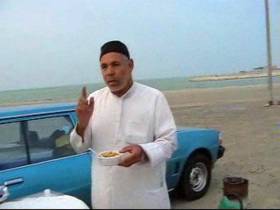
Yes, I'm still alive and well! Some family from abroad are visiting me right now so I've been busy with them. Many thanks to those who contacted me to make sure I was in good health. I promise that next time I'll let you guys know beforehand if I'm going to be absent.
Anyhows, I've been showing my family around Bahrain these past two weeks doing the regular tourist thing. While driving in the car two days ago, my cousin asked me "so what's so special about Bahrain anyways?". For years I've been telling my family and friends abroad about how Bahrain is such a great place to live and how the people are so good-natured. In the few days that my cousin got to spend on the island, he didn't see any of that. He pushed me on it, and it made me think more honestly about why I hold this place in such high regard.
I had to agree with him that the people he had observed and interacted were not amazingly friendly or anything. I realized that I am more attached to the memories of the people I had when I was younger; when if you got a flat tyre, strangers would stop on the side of the road and insist on helping you change it; when salesmen would bring you a chair and a cup of tea, even if you were just there to browse; when hitch-hiking was considered absolutely safe and normal. But things have certainly changed since those days. It seems to have become more and more rare to come across people who have still maintained that tolerant, friendly and extremely helpful frame of mind, especially towards foreigners.
Although there are many ways that one could analyze this change, if you ask me I would attribute it to the change in employment and lifestyle trends. Traditionally, Bahrain has been a very important trading point for the region, so the people, particularly the traders, had to maintain good relations with others. Not to suggest that their behaviour is purely selfish, but rather I imagine that this is how the tradition of friendliness towards others was started, and later it just became part of the culture.
The situation today however is that most people are employed in office jobs (especially in government offices) that don't require each of them to personally interact with (let alone maintain good relations with) foreigners. So over time I feel that the tradition of openness towards others is slowly eroding away. That doesn't mean it is obsolete, but it's just not as common among today's younger generations as it was a while back.
Well anyways, later that same day I took my cousin to the Diraz beach to have a cup of tea as the sun set. And sure enough, we came across a fine gentleman who showed my cousin what Bahraini hospitality is all about. He was an old man (pictured above) from Barbar selling snacks and drinks out of his beat up station wagon on the beach. As soon as he realized that my cousin was visiting the island he insisted on giving us some free tea to go along with the chick peas we had just bought. He then opened up a spare folding chair for my cousin and gave up his own chair for me to sit down while we ate. We chatted with him for a while, myself addressing him in my broken Arabic, and him replying to us in his broken Urdu and English. Before finally leaving I tried to give him some money for the tea, but he refused. We playfully fought for a while, each trying to have our own way, but in the end I had to give in so as not to insult him and accepted his free hospitality. A true gentleman he was.
I had mixed feelings on the way back. On the one hand I was rather saddened that people of his kind have become so few today compared to how it was when I was younger. But I was also quite relieved that there are a few his kind still around.
Once again, Mahmood has created another great outlet for the Bahrain online community (to waste our time!). BahrainWiki is a place where we can collaboratively record all information about Bahrain.
For those of you that are unfamiliar with the idea of a "wiki" click here, and also explore around Wikipedia as an example. In short though:
A Wiki or wiki (pronounced "wicky" or "veekee") is a website (or other hypertext document collection) that allows a user to add content, as on an Internet forum, but also allows that content to be edited by anybody.
BahrainWiki then is a place for us to collect as much information about Bahrain as possible. Personally, I am particularly interested in recording that information that has not been publicly recorded in the past, such as historic folk tales (1, 2), restaurant and business reviews, and underground modern culture. Hopefully, it will (given some time) become the ultimate resource for anyone who needs information about anything related to Bahrain.